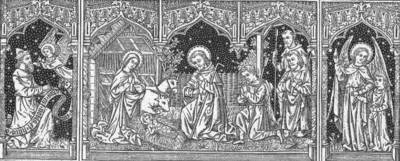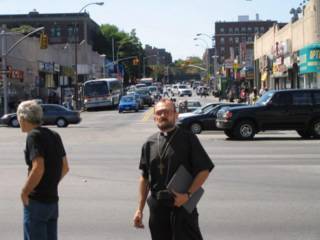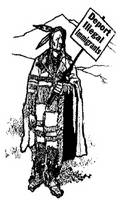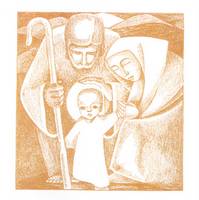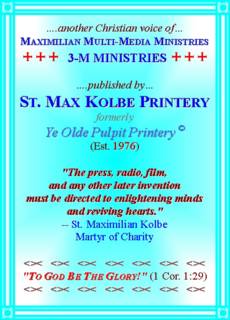"Chalking of the Doors" Epiphany Home Blessing
....In representation of St. John the Baptist, who came before Christ, proclaiming His coming and enlightening the world about Him, a family member leads the priest through the house with a candle as he is performing the blessing... All the rooms of the house are sprinkled with holy water and each of the four outer walls are anointed with the sign of the Cross with holy oil, a candle placed before them, and after the censing of the house, the lesson from the Holy Gospel is read. At the conclusion of the blessing, the inhabitants are blessed with holy water: the husband first, followed by the wife and then the children — the oldest first. Relatives and friends present are then blessed.
The blessing of the home is often given by pastors, either individually or if the parish is so large that this is impossible, from the church steeple in the four directions. If there is no blessing of houses in your parish on Epiphany, the father may go through the various rooms of the home sprinkling the Theophany water or with ordinary holy water if the other has not been blessed. If the pastor is going to bless the homes from the church, the father of the family should perform the ceremony for his home at the same time. As the various rooms are sprinkled, the father reads the prayer:
Bless, O Lord, almighty God, this home so that in it there may be health, chastity, victorious strength, humility, goodness and mildness, obedience to God's laws, and acts of thanks to God the Father, Son, and the Holy Spirit, and may this Blessing remain upon this house, and upon all who dwell in it. Through Christ Our Lord, Amen.
God of Bethlehem and Cana,
God of Jordan's leaping waters,
in baptism You bring us into Your Family.
You wed us and embrace us as Your Beloved.
May we fill this place with kindness to one another,
with hospitality to guests, and with abundant care
for every stranger.
By the light of a star
guide home all who seek You
on paths of faith, hope and love.
Then we will join the angels in
proclaiming Your praise:
Glory in heaven and peace on earth,
now and forever. AMEN.
* It is wrong to consider commissioned blessings without efficacy when the layman reads them. By our Baptism we have a share in Christ's Priesthood. If we are part of Christ in His Mystical Body, and He is High Priest, we share this with Him. Ours is not the same as the power of the consecrated priest, but it is our right and privilege to ask God's blessing on the things we use in daily life, and we should exercise this privilege often.
"....We are accustomed to hear that the sacramentals work 'ex opere operantis,' which would mean in virtue of the intensity of devotion in those who use them. Yet this is only part of the truth. The thing is cast in an altogether different light when it is stated in full precision, namely, that the sacramentals work 'ex opere operantis Ecclesiae,' which means that their efficacy is in first place dependent on the power of the Church's intercession, and only secondly on the devout dispositions of the subject concerned. Back in the Middle Ages, William of Paris stated: 'The efficacy of the sacramentals is rooted in the nobility of the Church, which is so pleasing to God and so beloved by Him that she never meets with a refusal from Him.' The matter could hardly be expressed better. Owing to the resurgence of the doctrine of the mystical body, it has been granted to our times to view The Church once more in Her true nature as the body of Christ, flesh of His flesh, bone of His bone, more intimate a part of Him than a bride is of her bridegroom. Therefore, it is not exactly improper to speak of an efficacy 'ex opere operato' in the case of sacramentals. For example, an altar that receives the consecration of the Church is consecrated and remains consecrated, no matter how fervent and devout was the bishop who performed the consecration. ....Although we have stressed the truth that the sacramentals derive their efficacy chiefly from the intercessory power of The Church, we may not minimize the role played by man's own subjective dispositions... ("De sacramentis," Translated by Philip T. Weller, S.T.D., 1964)
Traditional Invocative Blessing
PRIEST: Peace be to this house.
ALL: And to all who dwell herein.
PRIEST: Let us pray. O God, Who on this day revealed Your only-begotten Son to all nations by the guidance of a star, grant that we who now know You by faith may finally behold You in Your Heavenly Majesty; through Christ our Lord. R. Amen.
ALL: Be enlightened and shine forth, O Jerusalem, for your light is come; and upon you is risen the glory of the Lord Jesus Christ born of the Virgin Mary.
PRIEST: Nations shall walk in Your Light, and kings in the splendor of Your Birth.
ALL: And the glory of the Lord is risen upon you.
ALL: Antiphon: From the East the Magi came to Bethlehem to adore the Lord; and opening their treasures, they offered costly gifts: gold to the great King, incense to the true God, and myrrh in symbol of His burial. Alleluia.
Using chalk blessed in Holy Theophany Water, (hence, “Chalking the Door”) the priest and/or family members inscribes the lintel of the home (the horizontal frame above the entry door) with the inscription shown below. The letters C+M+B come from the traditional (9th century) names for the “three kings” — Caspar, Melchior & Balthazar. Some also suggest that it means “Christus Mansionem Benedicat” which translates to “May Christ Bless this House.”
20 + C + M + B + 05
Then, while the home is then being incensed and sprinkled with Holy Water, ALL follow him and read the Canticle of The Magnificat (LUKE 1: 46-55)
And Mary said: My soul doth magnify The Lord.
And my spirit hath rejoiced in God my Savior.
Because He hath regarded the humility of His handmaid:
for behold from henceforth
all generations shall call me blessed.
Because He that is mighty hath done great things to me:
and Holy is His Name.
And His Mercy is from generation unto generations,
to them that fear Him.
He hath showed might in His arm:
He hath scattered the proud in the conceit of their heart.
He hath put down the mighty from their seat
and hath exalted the humble.
He hath filled the hungry with good things:
and the rich He hath sent away empty.
He hath received Israel His servant,
being mindful of His mercy.
As He spoke to our fathers:
to Abraham and to His seed for ever.
PRIEST: Lord, remember Your children and teach us to pray:
The Our Father is prayed TOGETHER. The laity may join hands or extend their hands outward and upward (orans) for this prayer.
ALL:
Be enlightened and shine forth, O Jerusalem, for thy light is come, and upon thee is risen the Glory of The Lord, Jesus Christ born of the Virgin Mary.
V. Nations shall walk in Thy Light, and kings in the splendor of Thy Birth.
R. And the Glory of The Lord is risen upon thee.



